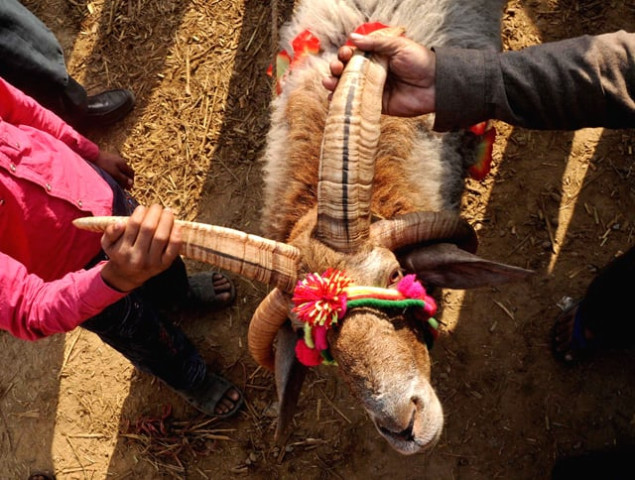IDPs in Musharraf Colony rejoice over goats and bangles
Since the flood survivors have lost everything they owned, festivals like Eid alienate them even more.

At her tent village near Musharraf Colony in Keamari Town, Mirzadi feels lucky that her family has a goat they can sacrifice on Eidul Azha. “I’ve named him Tiger. I feed it and play with it every day,” she said happily. Mirzadi’s family lost everything they owned in the floods. They shifted from their hometown in Jacobabad to take shelter in Karachi’s relief camps. She has a sister and two brothers, who are equally happy with the prospect of performing sacrificial rituals.
They were given the goat by the relief network working in the camp for the flood survivor rehabilitation. The network includes Potohar Organisation for Development Advocacy (PODA), an Islamabad-based NGO, Roshni Helpline, a Karachi-based children’s rights organisation, the Sindh home department and the Pakistan Association for Mental Health (PAMH). They have started a psychosocial and social support programme for the flood survivors.
Mirzadi’s joy, however, might be short-lived. Since her family is short on money, her father is thinking of selling the goat rather than slaughtering it. Well aware of her father’s plans, the young girl is now guarding her goat day and night. “Even if we don’t slaughter it, I want to take it back to my village,” she said.
Since the flood survivors have lost everything they owned, festivals like Eid alienate them even more, said Mohammad Ali, president of Roshni Helpline.
The NGO has made separate arrangements for women and children at the camp so they can spend their time in a more constructive manner. For women there is a 40x40 tent, where around 30 women come for vocational training, while for the children in the camp, there are four 20x20 tents for different age groups. They are given informal education for almost two hours, after which they are supervised during indoor and outdoor games that come to an end around 5 pm.
“The response from women and children has been overwhelming,” said Ali. He added that they have seen great improvement in the emotional state of the affectees now that they are spending their time in ‘constructive’ activities.
“This is why these psycho-social spaces were established,” he pointed out.
After the floods, around 12,000 people had sought refuge in the camp. Months later, there are still 8,000 people living here and they show no intention of leaving the city since at least in the camp they get two meals a day and drinking water from the government.
Women and children are the most vulnerable among displaced persons, said PODA Executive Director Sameena Nazir. It is important that welfare organisations look after them.
Making their smalls wishes come true on occasions like Eid helps increase their self-worth and this is essential for psychological healing, she added. She also invited other organisations to contribute generously for the well-being of flood survivors.
Due to the efforts already made, Mirzadi is not the only happy child in camp. Festivities were at an all-time high on Tuesday, a day before Eid. Children were busy having their hands decorated with henna, receiving new winter clothes, bangles and toys.
Ali said that most of the IDPs in the camp hail from Jacobabad and Kamber-Shahdadkot. Whenever the topic of going back home is broached, they reply that the water has not receded from their kachcha areas yet. Moreover, their houses have been washed away so they have no place to go back to.
Published in The Express Tribune, November 17th, 2010.



















COMMENTS
Comments are moderated and generally will be posted if they are on-topic and not abusive.
For more information, please see our Comments FAQ